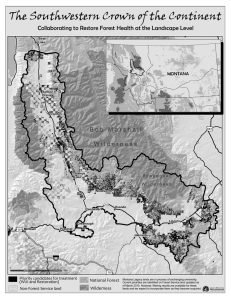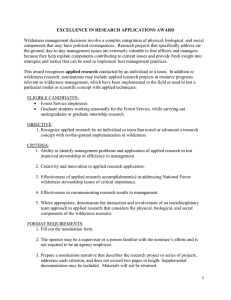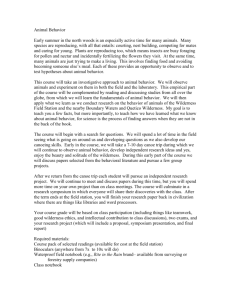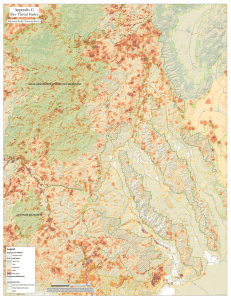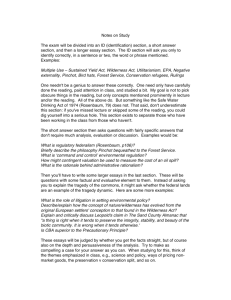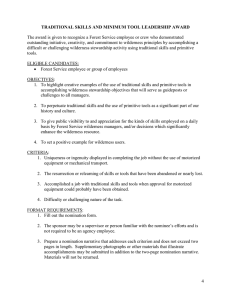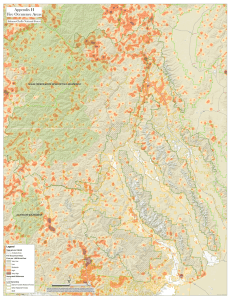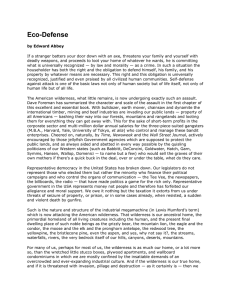P E r S P E c t I v... W I l d E r n E S S ... SCIENCE & RESEARCH
advertisement
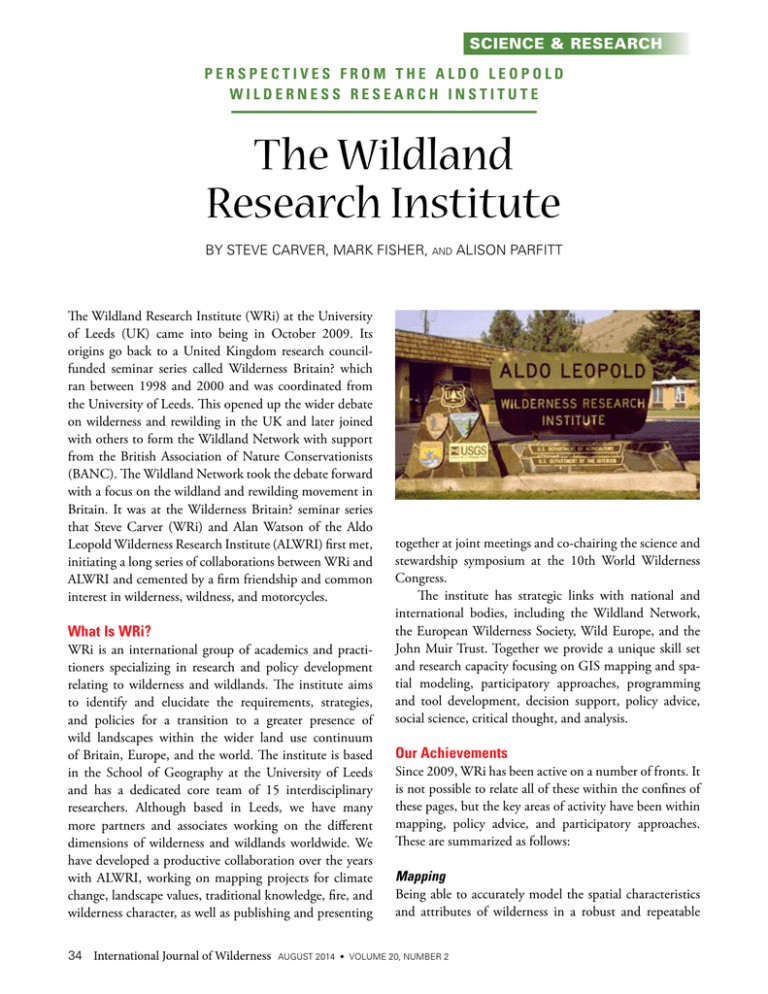
SCIENCE & RESEARCH P E R S P E CT I V E S FRO M TH E A LDO L E O P OLD W I LD E RN E S S R E S E A RCH I N S T I TUT E The Wildland Research Institute BY STEVE CARVER, MARK FISHER, and ALISON PARFITT The Wildland Research Institute (WRi) at the University of Leeds (UK) came into being in October 2009. Its origins go back to a United Kingdom research councilfunded seminar series called Wilderness Britain? which ran between 1998 and 2000 and was coordinated from the University of Leeds. This opened up the wider debate on wilderness and rewilding in the UK and later joined with others to form the Wildland Network with support from the British Association of Nature Conservationists (BANC). The Wildland Network took the debate forward with a focus on the wildland and rewilding movement in Britain. It was at the Wilderness Britain? seminar series that Steve Carver (WRi) and Alan Watson of the Aldo Leopold Wilderness Research Institute (ALWRI) first met, initiating a long series of collaborations between WRi and ALWRI and cemented by a firm friendship and common interest in wilderness, wildness, and motorcycles. What Is WRi? WRi is an international group of academics and practitioners specializing in research and policy development relating to wilderness and wildlands. The institute aims to identify and elucidate the requirements, strategies, and policies for a transition to a greater presence of wild landscapes within the wider land use continuum of Britain, Europe, and the world. The institute is based in the School of Geography at the University of Leeds and has a dedicated core team of 15 interdisciplinary researchers. Although based in Leeds, we have many more partners and associates working on the different dimensions of wilderness and wildlands worldwide. We have developed a productive collaboration over the years with ALWRI, working on mapping projects for climate change, landscape values, traditional knowledge, fire, and wilderness character, as well as publishing and presenting 34 International Journal of Wilderness together at joint meetings and co-chairing the science and stewardship symposium at the 10th World Wilderness Congress. The institute has strategic links with national and international bodies, including the Wildland Network, the European Wilderness Society, Wild Europe, and the John Muir Trust. Together we provide a unique skill set and research capacity focusing on GIS mapping and spatial modeling, participatory approaches, programming and tool development, decision support, policy advice, social science, critical thought, and analysis. Our Achievements Since 2009, WRi has been active on a number of fronts. It is not possible to relate all of these within the confines of these pages, but the key areas of activity have been within mapping, policy advice, and participatory approaches. These are summarized as follows: Mapping Being able to accurately model the spatial characteristics and attributes of wilderness in a robust and repeatable AUGUST 2014 • Volume 20, Number 2 fashion with a high degree of detail and certainty is often the key to achieving recognition of wild landscapes within the wider public policy and planning framework. Work by WRi members underpins much of the detailed mapping of wilderness quality being carried out in the world today. Examples include the Scottish national wildness map developed by Scottish Natural Heritage, the Scottish national parks, the new European Wilderness Quality Index developed for the European Environment Agency with colleagues in Alterra in the Netherlands, and a series of Wilderness Character maps developed for the U.S. National Park Service by James Tricker working at the ALWRI. Other examples include a wilderness map for Austria produced by Christoph Plutzar and a map for the Carpathian Mountains in Romania produced by Dragos Mantiou. Policy Advice Policy making in the 21st century relies on high quality information provided in a timely and understandable manner. WRi specializes in sourcing, researching, and providing policy advice to a range of clients across the social, business, and political spectrum. In 2010 the Scottish government contracted WRi to write a “review of the status and conservation of wild land in Europe” in support of developing policy on wildland in Scotland. The resulting 150-page document provides the most rigorous and comprehensive overview of wilderness in Europe to date and has been cited in the development of not only Scottish government policy on wildland but also that of the European Union. This led to WRi being part of the team developing the new European Wilderness Register. In addition, WRi has provided advice to various wilderness-facing organizations, including PAN Parks, the European Wilderness Society, The Wild Foundation, the John Muir Trust, Scottish Natural Heritage, and the U.S. Forest Service. Participatory Approaches One area where the WRi and ALWRI are currently collaborating is in the development of spatially explicit means of participatory decision support. Funded by the Joint Fire Science Program and the U.S. Forest Service through Joint Venture Agreements, WRi and ALWRI have jointly developed participatory approaches to understand values and meanings attached to landscapes in or adjacent to wilderness areas with respect to climate change and fire-adapted ecosystems. The emphasis of this work is how best to capture both the spatial pattern (linked to landscape units) and the AUGUST 2014 • Volume 20, Number 2 sentiments and local knowledge attached to these in a systematic way that allows both quantitative and qualitative analysis of value/ meaning, change, adaptation, and resilience. To this end we have jointly developed a new tool kit for collecting, collating, and analyzing this kind of information. Known as MapMe, this tool is now available for general use. For further information about WRi, including projects, people, and publications, see www.wildlandresearch.org. STEVE CARVER is a geographer with special interests in wilderness, landscape evaluation, and geographical information systems. He is director of the Wildland Research Institute based at the University of Leeds, UK; email: s.j.carver@leeds.ac.uk. MARK FISHER is a biochemist by training but is a self-taught expert on wilderness ecology and rewilding. He is an honorary research fellow with the Wildland Research Institute where he advises on ecosystems and policy development; email: m.n.fisher@leeds.ac.uk. ALISON PARFITT is an independent practitioner, researcher, sometimeactivist, and honorary research fellow with the Wildland Research Institute where she works to improve relationships and practice between academics and community activists for mutual benefit; email: a.parfitt@leeds.ac.uk. International Journal of Wilderness 35
